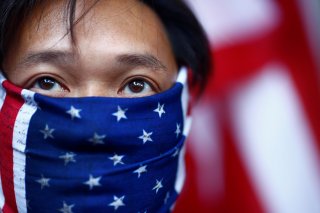China Is Struggling With ‘One Country’ That Has Two Visions of the Future
Beijing’s inability to rule wisely, honor its legal obligations, and deliver stability and order, which would be seen as a serious failure, would justify pressure being heaped upon Chinese and Hong Kong officials.
The key is to keep the controversy and outrage about Beijing’s actions on a constant and controlled simmer with the occasional deliberate flare up when events justify it. The rationale for responding with punitive and other measures must also be crafted for different audiences. To Americans and those in liberal democracies, China demonstrating disdain for democratic institutions and human rights is often reason enough. To many of China’s non-democratic neighbors, U.S. responses such as the passing of the 2019 Hong Kong Human Rights and Democracy Act which requires the U.S. government to impose sanctions against Chinese and Hong Kong officials committing human rights abuses, amongst other provisions, is less compelling. It is Beijing’s inability to rule wisely, honor its legal obligations, and deliver stability and order, which is seen as the more serious failure, would justify pressure being heaped upon Chinese and Hong Kong officials. Whereas Americans see a clash of values with China as the main game, many in the region see it as a contest of power and competing claims of competency. If Beijing’s leaders are increasingly held responsible for the unnecessary ruin of Hong Kong, then the supposed authoritarian competence of Beijing will be called into question.
Finally, the focus naturally turns to the other entity existing under a “One Country, Two Systems” framework with China. Given what is occurring in Hong Kong, Taiwan’s President Tsai Ing-wen is justified in her belief that Beijing cannot be trusted to preserve freedoms and maintain the Taiwanese way of life. An increasing majority of Taiwanese citizens agree.
This means that Taiwan is moving further away from Beijing’s grasp than ever before. At the same time and given the mainland’s pace of military modernization and activities in the East and South China Seas, the island’s geostrategic and military relevance to the United States is increasing. This ought to place renewed importance on meeting the obligations in the Taiwan Relations Act.
Even so, China’s strongest hand remains the economic leverage it has over Taiwan which is why Tsai is seeking to add a meaningful economic component to her New Southbound Policy (NSP) targeting countries in Southeast and South Asia as well as Oceania.
Although not within the geography of the NSP, the United States should offer Taiwan diplomatic help in broadening and deepening Taiwan’s participation in the regional economic space and in multilateral institutions, which China is seeking to block its membership. Indeed, Japan, South Korea, India, and the major Southeast Asian economies are all showing higher levels of interest in pursuing deeper economic relations with Taiwan than they have in the past due to Beijing’s increasingly aggressive policies. Many are warming to Taiwanese membership of the Comprehensive and Progressive Trans-Pacific Partnership and would welcome U.S. support for that occurring even if the latter is not a member of the CPTPP.
The United States can also take steps to encourage more bilateral investment, intra-industry engagement and firm-to-firm activity between the United States and Taiwan in high-value-added and high-tech sectors which is where Taiwan excels. Taipei has been working on a tax treaty with the United States since 2018, similar to what it has with almost seventy other countries. It has a strong interest in resuming formal free trade agreement talks with the United States which have been on ice since 2007. The political, strategic, and economic environment has changed for Taiwan, largely due to what is occurring in Hong Kong, and the Tsai government is far more likely to make compromises necessary to arrive at a mutually beneficial FTA.
Regardless of what happens in Hong Kong, Taiwan is the prize China covets most of all. The United States should never waste a crisis regardless of where it begins.
Dr. John Lee is a senior fellow at the Hudson Institute and United States Studies Centre in Sydney where he is an adjunct professor. From 2016–2018, he served as senior national security adviser to the Australian Foreign Minister.
Image: Reuters

